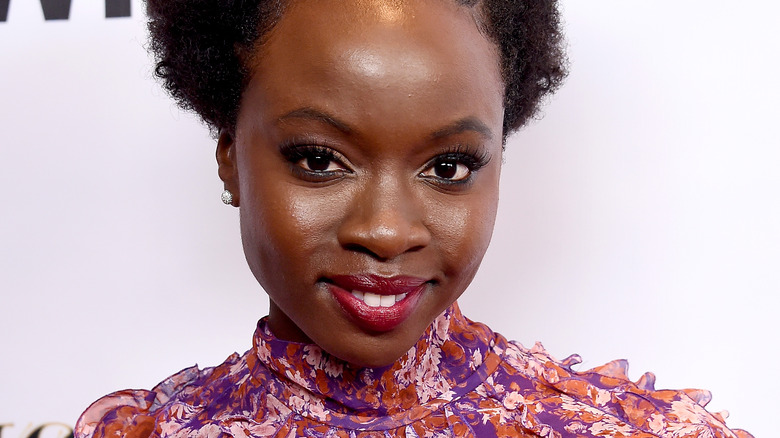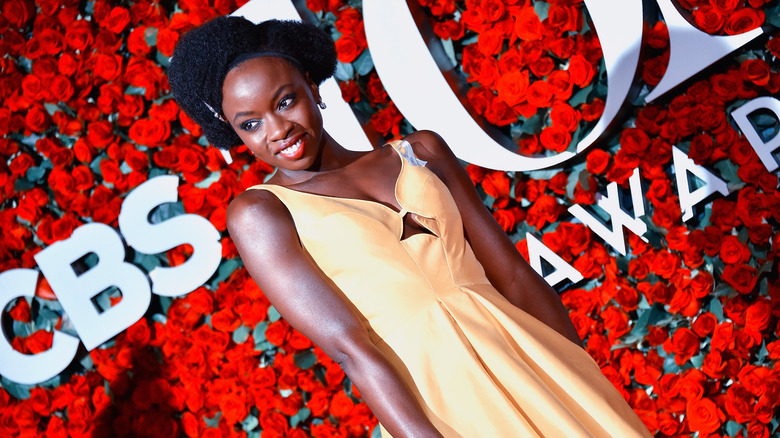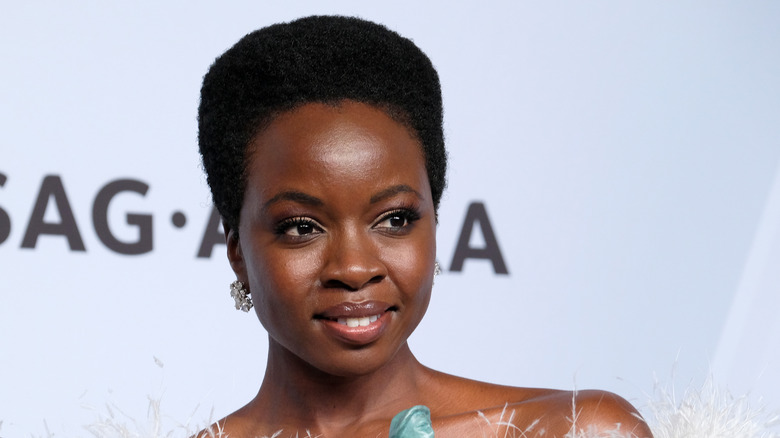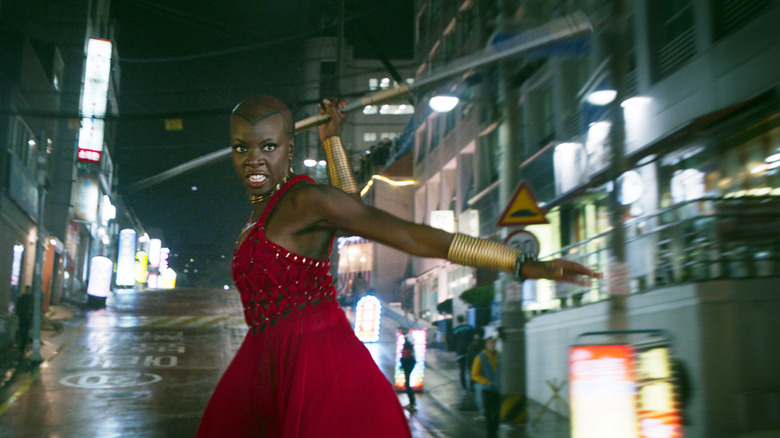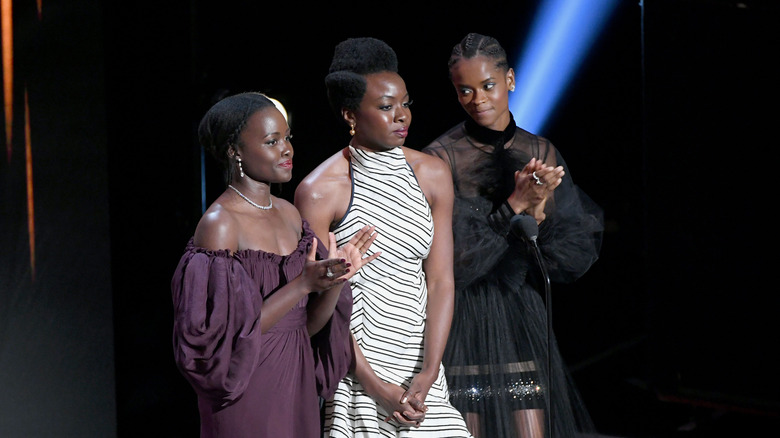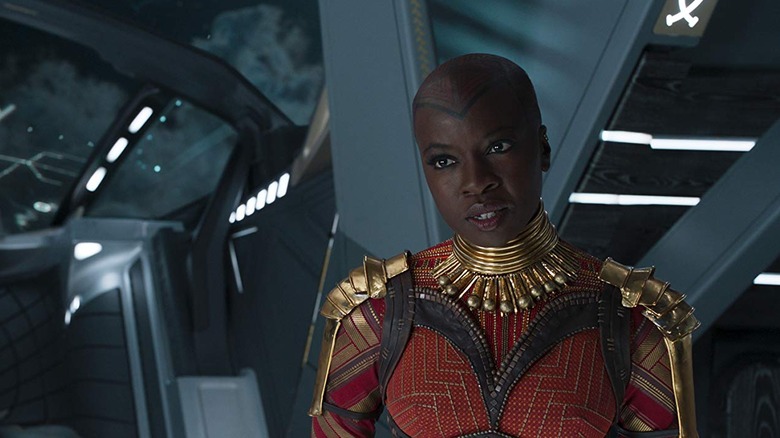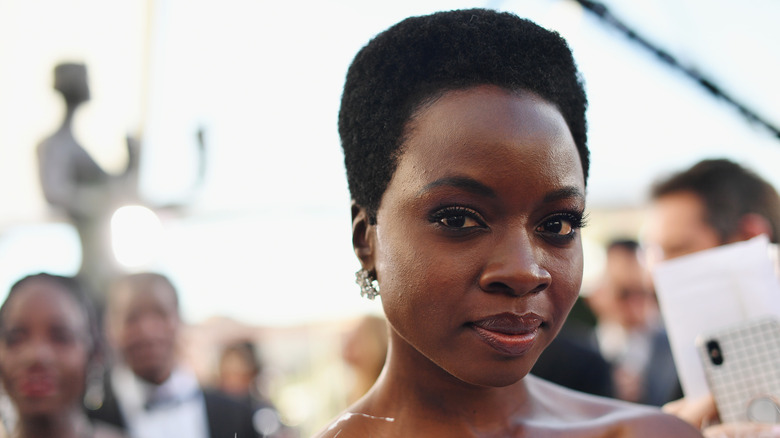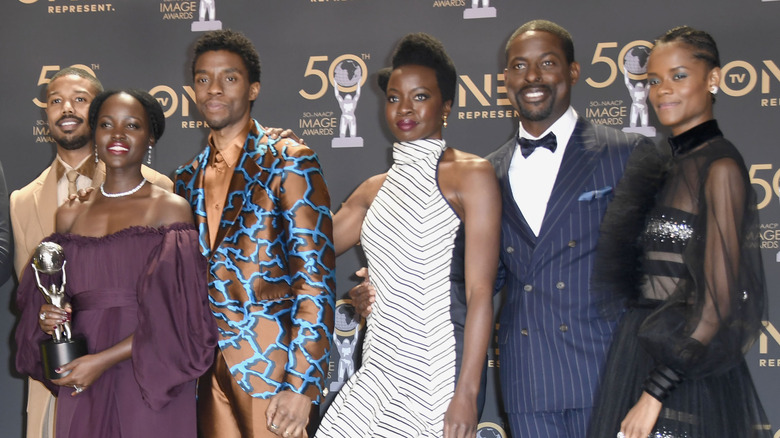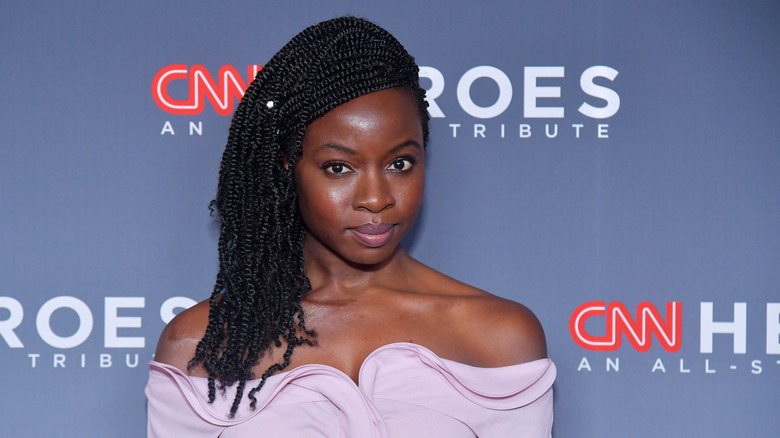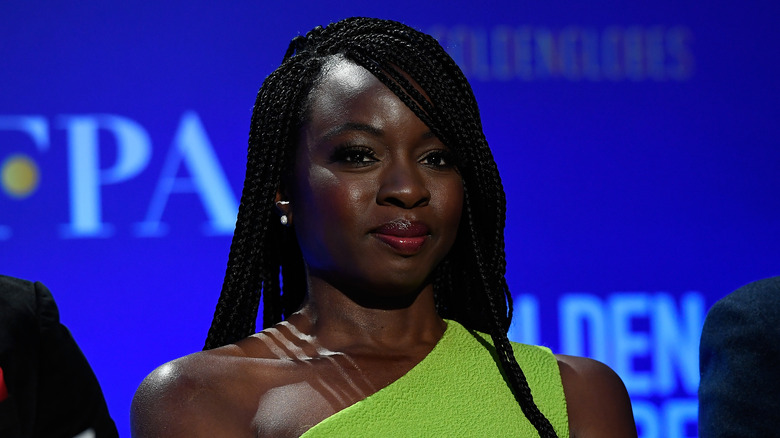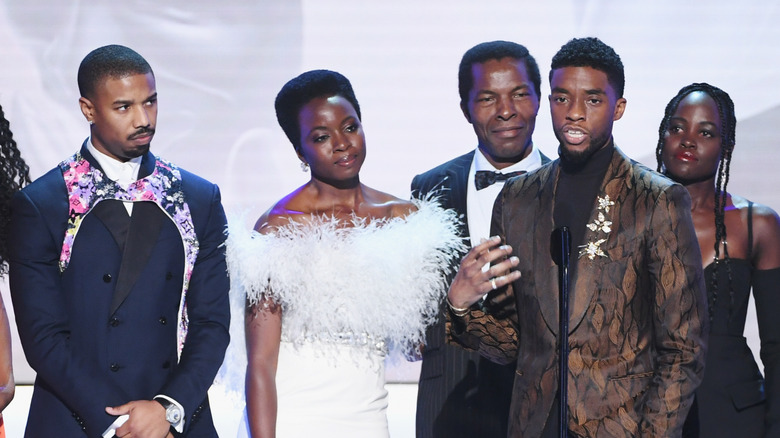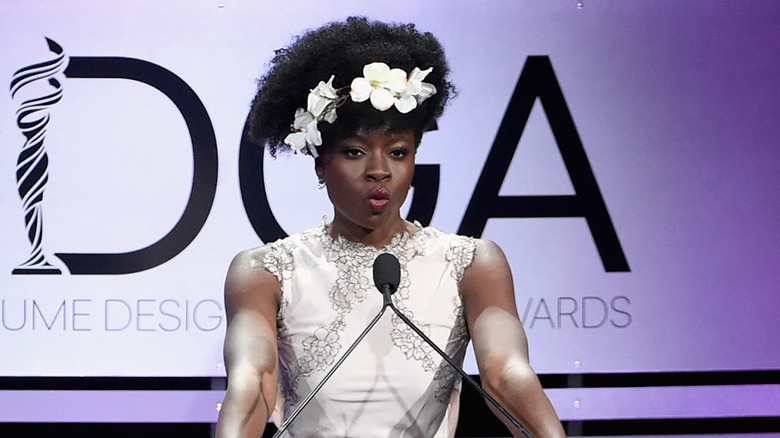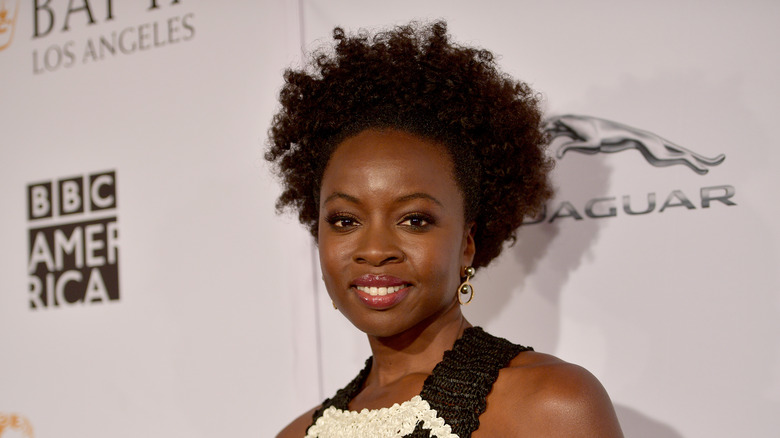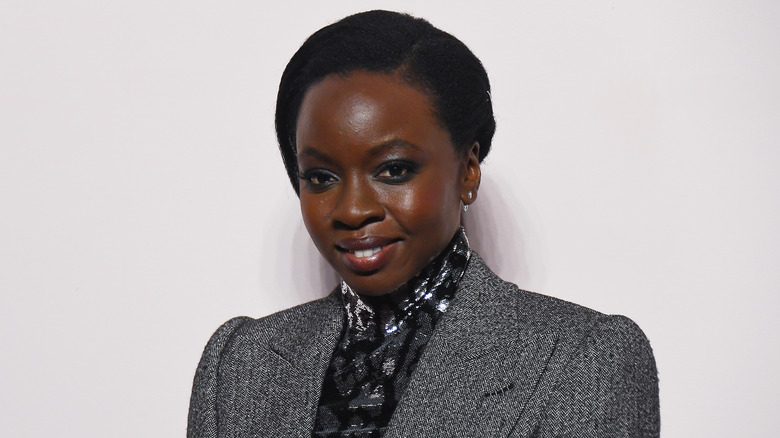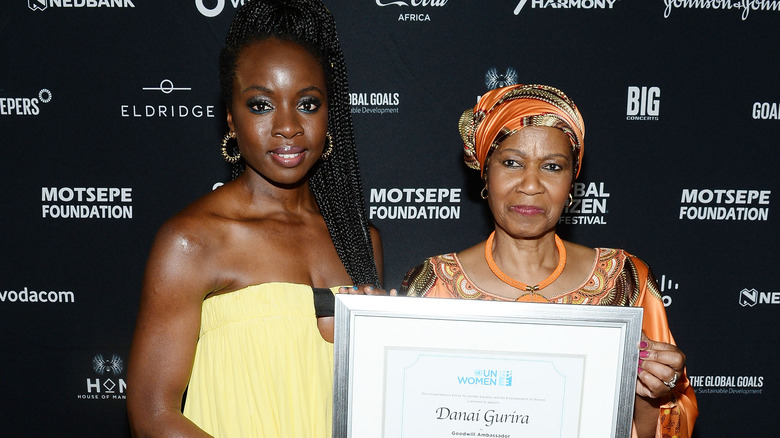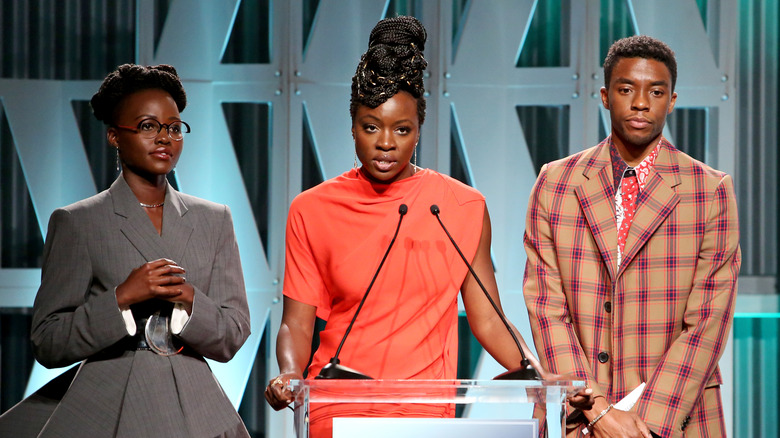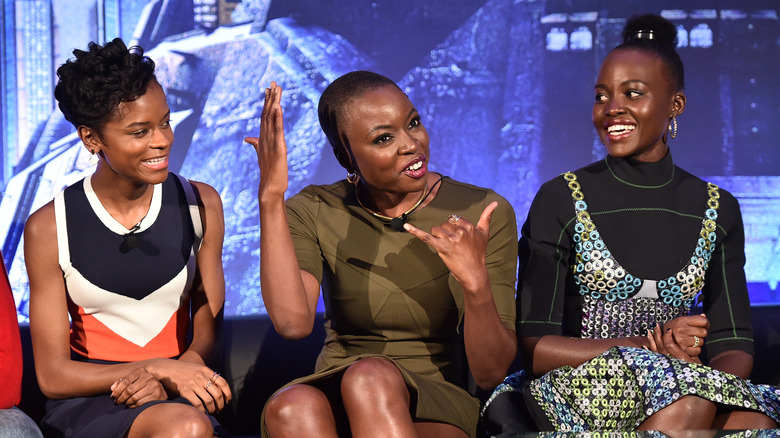The Untold Truth Of Danai Gurira
Danai Gurira has the kind of name you'll remember — and good thing, too, as the Hollywood star is definitely one to watch. The actress and playwright has two massive gigs to her name: The Walking Dead, where she plays badass warrior Michonne, and Black Panther, where she plays badass warrior general Okoye. Whether she's fighting off zombie hordes or battling for Wakanda, Gurira is a singular, empowering, and completely unique presence on screen.
Although she's broken out in a big way since her 2012 Walking Dead debut, Gurira has actually been working extensively in the industry for a long time. From mounting Broadway productions to making her mark as an activist, the talented multi-hyphenate has barely paused for breath. Although she was shocked when director Ryan Coogler called, Black Panther is just one standout in a string of memorable moments in the life of Danai Gurira. This is her untold truth.
She went from cardigans to high fashion
These days, Gurira is most well known for rocking regal robes as Okoye or a functional headband as Michonne, depending on which massive franchise she's currently heading up. But back in 2016, when she was attending that year's Tony Awards, Gurira found the process of swapping her everyday duds for fancy frocks.
Reflecting on that exciting time in her life in a piece for Harper's Bazaar, Gurira noted, "Trading in my cardigan for a stunning canary-yellow Rosie Assoulin dress was a surreal experience." The playwright, who didn't end up winning for best play-nominated Eclipsed, her tale of Liberian women struggling to survive towards the end of that country's Second Civil War, revealed the dress instantly spoke to her on a profound level. "For me, the color symbolized the journey of Liberia and how the sun shone through at the end when women led a mass peace movement and Ellen Johnson Sirleaf became the first elected female head of state in all of Africa," she shared of the gown's connection to her story.
She's proud of her unique moniker
Although it's difficult to imagine, there was a time when Danai Gurira wasn't Danai Gurira. Rather, she was Dede Gurira. As the actress explained in a powerful essay for Glamour, she didn't even know her real name (which means "to be in love" or "to love one another" in Shona) until the age of five. Living in small-town Iowa, the youngster's mother didn't want to make anybody struggle trying to pronounce her daughter's African name.
Even when the family relocated back to Zimbabwe, Dede stuck. It was only as Gurira got older that she started to question her Americanized moniker. "As I went into my adolescent years, a consciousness built up in me ... I started to connect the dots around why I was rejecting my people's cultural markers and the dominating effects of Eurocentric culture," she explained.
Soon, she embraced her birth name, noting, "I saw that rejecting my own culture, down to the name my parents had given me, was unacceptable. All of a sudden I needed to lay claim to what folks had fought and died for me to have — the freedom to speak my own language, my own name."
She believes all women can learn from Okoye
The actress believes women across the globe, especially black women, can learn a lot from her super strong Black Panther character, Okoye. Gurira believes her badass character teaches us to subvert the expectations placed upon us by a patriarchal society and to question everything we've been told about strength versus femininity. She discussed this and the greater point of working towards female empowerment in a wide-ranging interview with Bustle.
"I think that a powerful woman of today has to be subversive, because what is conventional is not acceptable for us anymore. ... I'd say if there's any little bit of Okoye I'd love anyone to have, including myself, is to subvert any lies that we've been told. [For example], she's fierce and feminine. The two things live together quite contentedly in her, and I think that... We've been lied to about that too, and we can't let that be perpetuated anymore. We can be all those things," the Black Panther star stated emphatically.
She cast her fellow Wakandans
Black Panther was a major moment for African representation, but the film was also a celebration of female empowerment in its own right. Gurira starred alongside Lupita Nyong'o and Letitia Wright, among others, with the trio boasting some serious BFF chemistry. As it turns out, this isn't the first time these three talented ladies have worked together. As Gurira explained to /Film, she, Nyong'o, and Wright all go way back.
Gurira cast Nyong'o in her play Eclipsed, which led to the two spending "a lot of 2015 and 2016 together, right through the Tony season and all that." Gurira explained, "We are very much close sisters," adding, "It was very much balancing off each other and supporting each other, and our thoughts and collaborations ... We were making sure we had fun because I'm the person that needs to be encourage-minded to have fun, and she made sure I did that."
Likewise Wright was cast in the same role during the play's London run. Gurira noted, "I loved her from the second I saw her."
She was thrilled to throw her wig off
One of Black Panther's most iconic moments in a movie loaded with iconic moments sees Gurira's Okoye fighting off henchmen using both her trusty spear and... a wig. After adopting a disguise to infiltrate a gathering of no-goods, Gurira ends up battling in her finery. And, in a hilariously brilliant maneuver, the warrior general chucks off her wig to use during a fight.
As the actress told Elle, she had no idea the scene would have such a massive impact, but Gurira understands its power — particularly with African-American women. "I loved it. I thought it was subversive in a really important way. I thought it sort of threw a wig in the face of western beauty concepts," she explained.
The Black Panther star, who often sports cropped hair, went on to share that she doesn't pay mind to people's hairstyles. "It's just about a freedom of knowing all ways are fine and can be embraced by women, and nothing of that defines your femininity," she said. "I thought it was a great combination of subversive femininity and ferocity at the same time."
She works out like a superhero
Marvel stars often dedicate themselves to intense workouts to get into shape to play superheroes, but we doubt Gurira needed Marvel's push to exercise. As evidenced by a Women's Health interview entitled "Black Panther Star Danai Gurira Does The Most Intense Workout You've Ever Seen," the actress doesn't play around when it comes to fitness.
As Gurira explained in the interview, she uses exercise as a way to keep stress in check. She grew up doing hockey, swimming, and track, and intersperses regular yoga workouts and jogs with her dog with gym-based routines with her trainer, whose sessions are so intense Gurira "can't remember what [they] did." Her line of work may rely on keeping in top physical condition, but fitness is a no-brainer for her, with the actress admitting, "If I haven't worked out, if I haven't exercised and connected with my body in some way, it chips away at my feeling of well-being."
Black Panther gave her an enormous sense of pride
Black Panther was a major turning point for Marvel and its cast and crew alike. It wasn't just about the setting or the pride those involved felt in finally getting to tell their stories — it was everything about the experience. In an interview with NPR, Gurira gushed about the film's impact on her personally.
"The idea of actually touching into Africans being treated with this sort of respect and on this type of a platform, and the narrative coming from ... the black perspective entirely. ... There's something about the pride that this shows, that Wakanda shows — African pride, black pride, pride of your people, of your culture, of you know, who you are outside of any hegemonical influence, and how you can create your own hegemony right there amongst your own people," she explained.
The actress argued that people from all backgrounds could relate to Black Panther, given its themes of representation and acceptance of one's own culture. Gurira took particular interest in the speaking of Xhosa, a native language from the Cape region of South Africa, in the movie, which she described as "the coolest thing in the world."
She sees creating as a necessity
As an established playwright, Gurira is upfront about what it takes for her to get the creative juices flowing. In an interview published by McCarter Theatre (via Marin Theatre Company) about her play The Convert, she opened up about why she began penning her own stories in the first place. "In terms of writing, I just wasn't finding enough stories about contemporary African people — or historical, just anything, the whole gamut," she explained.
As Gurira shared, becoming a writer was a necessity rather than a natural progression for her because the acting roles just weren't there. "I was starting to look for what I would like to perform, what I would like to see put to life onstage, and I was finding many stories about everybody else, but none about my own people. My playwriting became a 'necessity being the mother of invention' type thing. I wasn't finding what I wanted to perform, so I started to create it myself," she stated.
She strives for universality
In her interview published by McCarter Theatre and Marin Theatre Company, Gurira discussed why she found pressure to make her stories more accessible for a western audience confounding.
In particular, she fought back against accusations that conducting parts of her play The Convert in Shona with no translation isolated potential audiences, reasoning, "Meaningful communication is an aspect of who we are as human beings. You don't need to know exactly what everyone's saying word for word to hear it ... [Shona] is an element that is not only crucial and essential, but is also enriching, for the Western ear."
She aims to make her work universal, but refuses to commercialize it, arguing, "The more specific you get in your cultural expression, the more human you're going to get. The idea that sometimes I hear even from my own fellow artists in Zimbabwe is, we have to make it commercially viable, we have to make it work for the rest of the world. I say, actually that's going to make it not work. Because it's going to step it away from the truth."
She was shocked when Marvel came calling
Black Panther writer-director Ryan Coogler offered Gurira the role of fearsome warrior Okoye right out the gate, but that didn't make her any less shocked to receive the call.
"When I got the offer, I was at the opening of my play Eclipsed on Broadway. My manager decided to tell me as I was walking out to the car to leave, and I was like, 'What?' I couldn't even process what he was saying, and then I got back to LA a few weeks later, I sat down with Ryan and really had an astounding experience talking to him," she gushed in an interview with Deadline.
Gurira was a huge fan of Coogler already, and their connection was instant. She didn't even need to read anything before taking the job, admitting, "I was so excited. I couldn't remember where I parked my car after that meeting ... I was all the way in long before I had a script."
She's all about activism, not entertainment
When questioned by Deadline about why she got into the entertainment biz, Gurira gave a less-than-typical response. She explained that she doesn't consider herself a performer and described her job as that of an activist. "What's funny is that I never saw what I wanted to do as entertainment. That's going to sound wretchedly pretentious, but I never did. I always saw what I was going to do as needing to tell stories that aren't being told. Why isn't the African female voice being heard? What can I do to help that happen? It was always this kind of urgency and passion about it for me, and rage, really," she explained.
A trip to South Africa furthered her aspirations, as she "realized how people have used the arts to affect social change." She stated, "Storytelling is such a fantastic way to do that. The plays I wrote, it's all connected to that, and the things I agreed to do are connected to that."
She Eclipsed all other Broadway productions
Gurira's Eclipsed was the first Broadway play with an all-female cast, writer, and director — not just black females, either, although it was that, too. In an interview with Vogue, she discussed why it was such an important moment for the greater Broadway community. "There always has to be a first. I'm surprised the first is in 2016, but some people need precedent. I don't need precedent, because I understand that there are things I have to do that might never have been done before. But it's an important thing for people to see that many, many people of color come to the theater. These old models of who comes and what sells, they're really archaic and obsolete," she explained.
Gurira went on to note that she and fellow Broadway vet Cynthia Erivo were overwhelmed by the attention from the black community, noting, "I was at the Africa Fair Festival that they do every year at BAM, and I was walking with [The Color Purple star] Cynthia Erivo. We couldn't get ten steps without people coming up to us saying they'd just watched our plays."
She's a self-described "Zamerican"
Gurira grew up in Iowa, but moved to Zimbabwe as a kid. As a result, American culture informed much of her adolescence, shaping how she saw and understood the United States before her family ultimately returned there. She read Roots and Judy Blume, listened to Snoop Dogg, and watched classic soap Dynasty. Her mother, meanwhile, kept an autographed photo of Martin Luther King Jr. in their home, as she'd met him while in college in the United States. So, Gurira always felt a deep connection to the U.S.
Another American influence came in the form of Eddie Murphy's Coming To America. The film had so much of an impact that she and Lupita Nyong'o threw a costume party where they both dressed up as characters from the movie, and her play Eclipsed also opens with a young woman recounting the plot of the film to another character.
As such, the Black Panther star described herself as a "Zamerican" in an interview with Rolling Stone. She explained, "American culture is everywhere," but she noted, "My culture isn't everywhere."
She's not ruling out a political endgame
Gurira has been an activist her whole life, and she balances it with her other passions accordingly — from speaking at the United Nations to creating Love Our Girls, which aims to "spread awareness about women and girls around the globe" facing injustices. She told Vogue she created LOG "as an awareness hub for people" and advised readers to look into Girl Up and Malala's Fund.
"The more I keep myself aware, the more I get sparked with outrage and ideas around how I can make a difference. We're still stuck in an epidemic around this issue, and it's crazy. ... Why is there no gender equality anywhere on the globe? We've got to give it our full attention," she raged. Although the actress admitted she's "felt a calling to do more" following the shock of the 2016 U.S. presidential election, as noted by Rolling Stone, she isn't pushed to take on the political world herself. At least, not yet anyway.
"I want to do so much with telling stories," she said, pausing before adding, "Maybe in 10 years, we'll see."
She fought to Bring Back Our Girls
The plight of women and girls around the world is obviously close to Gurira's heart, and this was never clearer than when her play Eclipsed was on Broadway. As noted by Vogue, the abduction of 276 schoolgirls in Chibok, Nigeria by terrorist organization Boko Haram in 2014 significantly affected the show. Each night, following the performance, the names of four of the missing girls were shared onstage. The playwright noted, "There is power in naming."
When questioned about how the abduction affected her, Gurira passionately stated, "If my work is on the stage, you can be rested assured I'm going to make use of it as a platform for activism as much as possible."
She also noted her collaboration with the Bring Back Our Girls and ONE campaigns had "allowed for [them] to start actually putting the names of these girls in the mouths of [their] audiences." She added, "We hope that this play puts a burden on the hearts of our audiences, to know that this is an issue in the world that we could all help to eradicate in ways big or small."
She's all about the sisterhood
Unsurprisingly for a woman who's dedicated much of her life to protecting the interests of women and girls worldwide, Danai Gurira is all about sisterhood on set — particularly when it comes to the Marvel movies. During a set visit for Avengers: Infinity War, the actress gushed to Screen Rant about how "astounding" the atmosphere on Marvel sets was for her and other women, especially her fellow Wakandans Lupita Nyong'o, Letitia Wright, and Angela Bassett.
Gurira noted that she and Nyong'o had "[become] even closer through this process," and she'd found it "amazing" to be in a film with Wright. She further enthused, "I've always really adored Ms. Bassett and she's always been so kind and gracious to me every time I've been around her."
As for their downtime, Gurira excitedly shared, "It was really beautiful, actually. We had a good time together. Supportive, fun, lots of going out on the weekend, lots of bowling, going to Nigerian food, partying. ... Yeah, it was a great sisterhood. We took a lot of care of each other."
